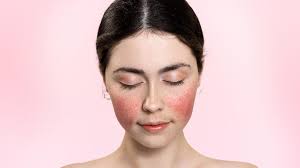
Overview
Rosacea is a chronic (persistent or even long-term) skin condition that causes redness and visible blood vessels on the face. It often includes small, red bumps. It can be commonly mistaken for acne or dermatitis, but it is vastly different. The skin condition affects over 14 million people in the United States. Rosacea primarily affects the central part of the face, including the cheeks, nose, chin, and forehead. However, it can also affect the neck, scalp, ears, and chest. Dermatologists, who you can read about here, are typically the specialists who diagnose and treat rosacea. In some cases, ophthalmologists may be involved if ocular symptoms are present.
Development & Symptoms
The exact cause of rosacea is unknown, but it tends to flare up irregularly. It can be triggered by environmental factors, lifestyle choices, and genetics. Additionally, stress, sun exposure, and alcohol can also affect people with rosacea. Some foods might also affect Rosacea. These include spicy food like pepper, but triggers can also vary as everyone’s triggers are unique! Symptoms of Rosacea can include acne-like bumps, consistent redness of the face, and visible blood vessels. Those with Ocular Rosacea experience dry or irritated eyes. Other types of rosacea can include papulopustular, phymatous, and erythematotelangiectatic. Although these might sound like insane words at first, these types are all similar to the common symptoms. In short, these types of rosacea cause pus-filled pimples, swollen, thick, bumpy skin, and enlarged blood vessels.
Treatment
Although there is no cure for rosacea, there are some treatments that can lessen symptoms. These include laser treatments, medication, lifestyle changes, and facial massages. Overall, most treatments for rosacea are therapeutic. Laser treatments, which are also used for Vitiligo, can reduce the appearance of large blood vessels and severe redness. Self-care can also play a major role in improving rosacea. Many might use moisturizers containing SPF, avoid sun exposure, and choose gentler skin care products. Such as fragrance-free moisturizers. While rosacea cannot be completely prevented, identifying and avoiding certain triggers can help manage rosacea. Sun protection and a gentle skincare routine can help.
Patients
Genetics, environmental factors, and skin type are all factors that might contribute to the development of rosacea. Those with fair skin who blush easily are more prone, but rosacea can affect anyone. It’s more common for women and also tends to start at around 30 years old. Also, the skin condition can be genetic, and tends to run in families. Rosacea can have major emotional effects due to its visible symptoms. In some cases, people with rosacea are often embarrassed and have low self-esteem.
Sources
https://www.aad.org/public/diseases/rosacea/triggers/tips
https://www.mayoclinic.org/diseases-conditions/rosacea/symptoms-causes/syc-20353815
https://my.clevelandclinic.org/health/diseases/12174-rosacea